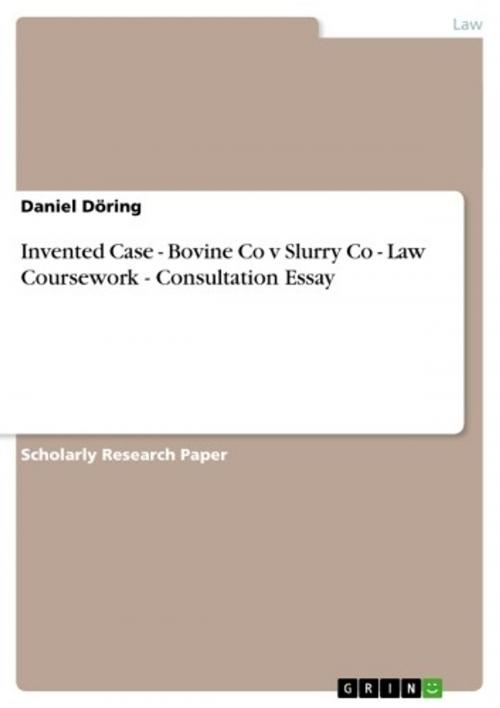Invented Case - Bovine Co v Slurry Co - Law Coursework - Consultation Essay
Bovine Co v Slurry Co - Law Coursework - Consultation Essay
Nonfiction, Reference & Language, Law| Author: | Daniel Döring | ISBN: | 9783638868358 |
| Publisher: | GRIN Publishing | Publication: | November 29, 2007 |
| Imprint: | GRIN Publishing | Language: | English |
| Author: | Daniel Döring |
| ISBN: | 9783638868358 |
| Publisher: | GRIN Publishing |
| Publication: | November 29, 2007 |
| Imprint: | GRIN Publishing |
| Language: | English |
Research Paper (undergraduate) from the year 2006 in the subject Law - Miscellaneous, grade: 1,2, The University of Sydney, 3 entries in the bibliography, language: English, abstract: 1. On Wednesday Bovine Co, a dairy farmer, visits Slurry Co, agricultural merchants in Warwickshire and agrees to buy 30 tons of 'Nitrogrow' fertiliser (all Fred has in stock), 300 gallons of diesel oil and a ' John D' tractor of which Slurry Co has several in his showroom. Bovine Co agrees to deliver the fertiliser and the tractor the following Friday and Bovine Co agrees to send a road tanker to collect the diesel oil the same day. Slurry Co agrees to give Bovine Co 28 days credit from the date of the sale in respect of the purchase price of all three items. On Thursday, Slurry Co discovers that 20 tons of the fertiliser have been stolen from his premises and it is impossible to obtain further supplies this season. Slurry Co delivers the remaining ten tons, but Bovine Co refuses to accept them. Bovine Co does not send a tanker to collect the diesel oil, which is in a tank containing 1,000 gallons, until two weeks after the date stipulated in the contract. He then finds that the oil has seriously deteriorated and he refuses to accept it. On Friday, Slurry Co puts the tractor on one of his own lorries for delivery to Bovine Co, but on the way the lorry is involved in a serious accident and the tractor is badly damaged. Slurry Co claims that Bovine Co is bound to pay for the oil and the tractor and to pay damages for non-acceptance of the fertiliser. Advise Bovine Co. In order to be able to refute the claims of Slurry Co, it is important to understand with whom the 'Property' of the various goods laid at the time of the various incidents. Property is defined as 'the absolute legal interest in the goods' (Sealy & Hooley, 2005, p. 254) and is indelibly linked to the concept of risk. Under various sections of the Sale of Goods Act, mention is given to 'the risk' passing to the buyer. In this case, 'the risk' is considered to be the chance that the goods may be wholly or partly destroyed or lost by theft. It should be noted that in this context, risk is not attributable to fault or inaction of either of the parties to the contract. In order to provide a clear path through the relevant sections of law, each item in the contract has been dealt with as a separate entity for analysis.
Research Paper (undergraduate) from the year 2006 in the subject Law - Miscellaneous, grade: 1,2, The University of Sydney, 3 entries in the bibliography, language: English, abstract: 1. On Wednesday Bovine Co, a dairy farmer, visits Slurry Co, agricultural merchants in Warwickshire and agrees to buy 30 tons of 'Nitrogrow' fertiliser (all Fred has in stock), 300 gallons of diesel oil and a ' John D' tractor of which Slurry Co has several in his showroom. Bovine Co agrees to deliver the fertiliser and the tractor the following Friday and Bovine Co agrees to send a road tanker to collect the diesel oil the same day. Slurry Co agrees to give Bovine Co 28 days credit from the date of the sale in respect of the purchase price of all three items. On Thursday, Slurry Co discovers that 20 tons of the fertiliser have been stolen from his premises and it is impossible to obtain further supplies this season. Slurry Co delivers the remaining ten tons, but Bovine Co refuses to accept them. Bovine Co does not send a tanker to collect the diesel oil, which is in a tank containing 1,000 gallons, until two weeks after the date stipulated in the contract. He then finds that the oil has seriously deteriorated and he refuses to accept it. On Friday, Slurry Co puts the tractor on one of his own lorries for delivery to Bovine Co, but on the way the lorry is involved in a serious accident and the tractor is badly damaged. Slurry Co claims that Bovine Co is bound to pay for the oil and the tractor and to pay damages for non-acceptance of the fertiliser. Advise Bovine Co. In order to be able to refute the claims of Slurry Co, it is important to understand with whom the 'Property' of the various goods laid at the time of the various incidents. Property is defined as 'the absolute legal interest in the goods' (Sealy & Hooley, 2005, p. 254) and is indelibly linked to the concept of risk. Under various sections of the Sale of Goods Act, mention is given to 'the risk' passing to the buyer. In this case, 'the risk' is considered to be the chance that the goods may be wholly or partly destroyed or lost by theft. It should be noted that in this context, risk is not attributable to fault or inaction of either of the parties to the contract. In order to provide a clear path through the relevant sections of law, each item in the contract has been dealt with as a separate entity for analysis.















